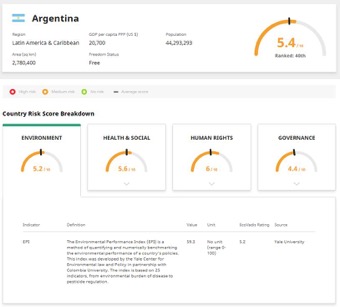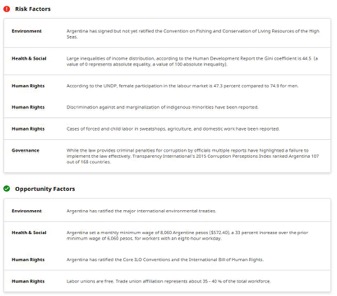As an additional service to our customers, EcoVadis provides profiles on over 150 countries. These profiles cover information on risks across four themes: Environment, health & social, human rights and governance. The profiles are accessible on the EcoVadis platform and available through a subscription to this additional service. The individual country profiles are made up of a quantitative section which includes scores on each theme as well as an overall score out of 10 (10 being least risky) and a qualitative section with risk and opportunity factors in each theme. We consider all scores over 6.0 to be no risk and countries with scores below 4.5 to be high risk.
These quantitative scores come from a number of international indexes identified by EcoVadis as reliable metrics that cover relevant sustainability topics around the world. Each theme is made up of up to five different indexes (see table below). The human rights theme for example is made up of five indexes, one of these is the Freedom of the Press index published annually by the french organization Reporters Sans Frontieres (Reporters Without Border).
Spotlight on Reporters Sans Frontieres (RSF)——————————————————————————————————————————
Reporters Sans Frontieres (RSF) is an international non-profit and non-governmental organization based in Paris. They publish an annual index of countries which scores 180 countries from 0 – 100 based on their freedom of information and freedom of the press, where 0 is considered completely free and 100 no freedom. RSF uses this index as an advocacy tool to put pressure on governments to improve the freedom of the press in countries with least freedom.
RSF calculates each country’s Freedom of the Press score based on two sources: 1) quantitative research 2) journalist survey responses. As part of the quantitative research, RSF looks for information on infractions against journalists including jail time and incidents of journalist homicide in each country. The second source, the journalist survey is completed by at least 5 journalists in every country. This survey ask a series of questions on what the journalists consider the situation regarding freedom of speech to be in the country in which they are working.
Over the past few years, RSF has seen trends of increasing threats to journalists and freedom of speech in eastern Europe and some Latin American countries. This seems to be the result of growing tensions and problems in each country’s internal politics
rsf.org/en/ranking.
——————————————————————————————————————————-
All indexes included in EcoVadis’ country scoring methodology, are reviewed annually or biannually to reflect relevant environmental, social or political changes in each country. To remain in line with these changes, EcoVadis updates its country risk scores annually as well. The last update occurred in October 2018.
Highlights of most recent update:
- Eight countries increased their risk level this includes Chile, Greece, Hungary, Turkey and South Korea.
- Six countries decreased their risk level, this includes: Honduras, Indonesia, Nepal and Ukraine
- Average overall score decreased from 5.1 to 5.0
- Range of scores condensed and the number of high risk countries increased from 42 to 49 while the number of no risk countries decreased from 36 to 30.
These country score changes are in line with the trends that RSF has observed over the past few years, in that EcoVadis scores also show Latin America and Eastern Europe becoming increasingly risky. This could be tied to the growing far right political movement in many of these countries.
The increasing risk of South Korea may be surprising to some, but this change can be attributed to the decrease in the human rights score. The decrease in the voice and accountability index and the continued low score for Global Slavery Index are of particular concern. Both of these indexes are heavily weighted within the rights theme, which is also the most heavily weighted theme. Human rights issues, such as freedom of speech and modern slavery, are of particular concern in this methodology since these tend to pose the largest risk to companies and their supply chains and should receive particular attention.
See below a sample snapshot of a country risk profile:


About the Author
Follow on Twitter Follow on Linkedin Visit Website More Content by EcoVadis EN










![[ProcessUnity] EcoVadis Explores the Intersection of TPRM and ESG](https://content.cdntwrk.com/mediaproxy?url=https%3A%2F%2Fembed-ssl.wistia.com%2Fdeliveries%2F6ea934ad56daf64a684d09ad69d5d502.jpg&size=1&version=1726068794&sig=3b0c5c0566157b657522d7198fb7b9f7&default=)